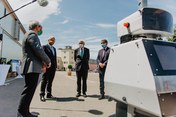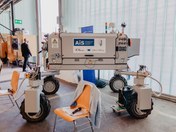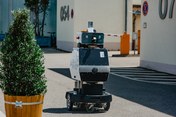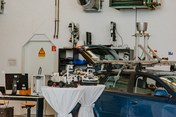Artificial Intelligence and cross-border medicine
Freiburg, Jul 10, 2020
Computer science professor Wolfram Burgard tells Hans-Jochen Schiewer, Winfried Kretschmann and Jean Rottner (from left) about AI research in Freiburg. Photo: Sandra Meyndt
Visiting on Friday, 10th July 2020 Baden-Württemberg Minister-President Winfried Kretschmann witnessed the leading position of the Albert Ludwig University in the field of artificial intelligence (AI) and the pioneering strategies for German-French cooperation in medicine at the Freiburg University Medical Center. He was accompanied by Jean Rottner, President of the Grand Est region. Rector Prof. Dr. Hans-Jochen Schiewer emphasized that as an internationally-recognized AI center, Freiburg is distinguished by its performance, creativity, innovation and diversity, “This is the case for research, teaching and transfer, and the performance data emphatically show it: in the field of artificial intelligence we are one of the strongest publishing institutions in the whole of Europe.” Most recently this strength has been acknowledged by the inclusion of the University of Freiburg in the European Laboratory for Learning and Intelligent Systems (ELLIS).
“Artificial intelligence offers perhaps the greatest transformative power there’s ever been in technical progress,” says Minister-President Kretschmann. So as an internationally-competitive home of innovation, Baden-Württemberg is investing massively in AI technology, “I’m impressed by the advances in research into human-machine interfaces at the University of Freiburg, and how they have practical applications, for instance, in the development of robots for medicine, agriculture or people with disabilities. The University of Freiburg is helping to ensure that the Federal State of Baden-Württemberg will remain an innovator in the field of AI. With the establishment of an ELLIS unit it is working with a European network of outstanding research sites, and I am especially delighted about this.”
In the Roboterhalle at the Faculty of Engineering scientists presented the many AI-related projects made in Freiburg: in future, self-navigating robot Obelix could carry out shopping errands and courier services; the Sensorauto, a car fitted with sensors, cameras and a complex localization system, collects data in urban traffic with the aim of enabling autonomous driving; the Canny service robot could be used in a hospital, for instance, to transport medicines. Canny is fitted with internal force sensors so that it responds to interactions in its environment and adapts to ensure the safety of the humans around it.
The ‘Responsible Artificial Intelligence’ Research Focus of the Freiburg Institute for Advanced Studies (FRIAS) offers an interdisciplinary approach to AI. The group considers normative and philosophical principles as well as the ethical, legal and social challenges affecting how people interact with intelligent systems. Schiewer also believes there is great potential for development in AI-related activity at the University of Freiburg in the new Intelligent Machine-Brain Interfacing Technology (IMBIT) research building and in the cooperation between the university and the Fraunhofer society.
On the visit of the Minister-President and the President of the Grand Est region to the hospital park, Prof. Dr. Frederik Wenz, executive medical director of Freiburg University Medical Center, highlighted the enormous value placed on AI and digitization in medicine in Freiburg. Wenz emphasized the importance of the close cross-border cooperation in health care, research and teaching in the field of medicine – particularly with regard to the cooperation with France in tackling the corona pandemic: “We in Freiburg are not only one of the hospitals with the greatest therapeutic experience nationally with this still very new disease, but are also closely interlinked in the region of the Upper Rhine with the three neighboring countries – and these times of pandemic have proven our strong neighborly relations especially to France.”
The Minister-President also emphasized the long-standing successful cooperation with the Grand Est region, “I thank the University Medical Center Freiburg particularly for the extraordinary efforts made in the treatment of coronavirus patients, some of whom also came from Alsace,” declared Kretschmann. “We want to make use of our close regional coordination and continue to develop it, because we can always do more. One possibility I see is a stand-by arrangement for crises. This would enable us to help and support one another even better when catastrophes or pandemics affect Grand Est or Baden-Württemberg.”
One important element in health care provision shared between Germany, France and Luxembourg, Wenz says, could be the CLINNOVA cooperative project, not least because the Strasbourg and Freiburg sites are already closely linked via the Eucor – The European Campus grouping. The CLINNOVA project could enable doctors to promote the diagnosis, prognosis and development of new treatment methods trinationally with the support of artificial intelligence and high-throughput analysis of large sets of data, and to develop standards and platforms for Europe. This could for example benefit people with tumors or complex inflammations.
 |
Wolfram Burgard, Hans-Jochen Schiewer, Photo: Sandra Meyndt |
 |
Bonirob Photo: Sandra Meyndt |
 |
Obelix Photo: Sandra Meyndt |
 |
Sensorauto Photo:Sandra Meyndt |

